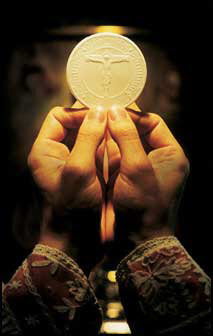...my flesh is true food...my blood is true drink...
after Pentecost
Proper 15- Year B
John 6:51-58
Our organist Julia Billet started it all off on the second Sunday of my
holidays when she read (and reflected upon) the Feeding of the Five Thousand in
the Gospel of John. By the time next
Sunday’s service is over we will have covered precisely 69 verses of the 6th
chapter of John’s Gospel over five Sundays (with a few verses here and there left out.)
1.
John 6:1-21
2.
John 6:24-35
3.
John 6:35, 41-51
4.
John 6:51-58
5.
John 6:56-69
It’s a relatively small section of scripture to cover five Sundays, don’t
you think? Mr and Mrs Lectionary down at
head office clearly see this as something important. We might want to pay attention.
Looked at from a height, the story at the beginning of John 6 starts out with a crowd and, at the
end of the chapter, it ends with a smaller group. It begins with something everybody can agree
with – an enormous feed, free food – to which everybody available makes sure
they can attend. It ends, in next week’s
Gospel reading, with only the twelve disciples and even they have something on
their mind they need to talk about. A lot of their fellows have voted with their feet. Jesus
has spoken frankly, he has used hard terms for the very first time that the
crowds can’t seem to get their heads around.
These would seem to be the subtitles of what Jesus has said in the various bits across the month.
This is a feast – you are invited.
This is more than a feast – are you interested in more than a feast?
Everyday bread will spoil and get stale.
The bread which I give gives life.
My gift is more than bread. It is
the bread which came down from heaven.
The Bread which I gives is my flesh for the life of the world.
Unless you eat the flesh of the Son of Man you will have no life within
you.
At the end of the story even the disciples are looking a bit despondent. Jesus will ask them, in next week's reading, if they intend to abandon
him too. “To whom would we go?” Peter will respond. No, they have come to believe
in him. They do not abandon. Even when the crowds begin to drift away they stay put.
The general moves to the particular and gains its weight in real life. It’s in the particular where you
say “Oh right! That’s what it means and that’s
what it costs. The goods are on the
other side of that door.” It’s where you
hear the challenge of belief and not merely the promise. You know the pattern:
Wouldn’t it be good to have children?
Wouldn’t it be great if we were married?
Wouldn’t a challenging job be rewarding?
Wouldn’t it be cool to live in France?
You have, many of you hearing or reading this, come to live the reality of these things which once upon a time were imprecise and unreal but which are now the tangible reality in which you both rejoice and weep and where you simply are.
In the Galilean springtime, on all of those hillsides early in the Gospel story, Jesus preached
the love of God. On the cross of Calvary
he showed what that love meant.
On those
hillsides he required only that we listened.
In the discourse we have been reading now, to the crowds, to the larger community of disciples and
to the Twelve he tells us that he wants us to unite with him. The language is
that of a meal where, in language of tremendous intimacy that jars with the taboos of his hearers, he tells us that he himself is the gift, the Lamb, and our very nourishment.
He doesn't want to be our guest speaker. He asks to be our life. He wants to know what we will say to that.


